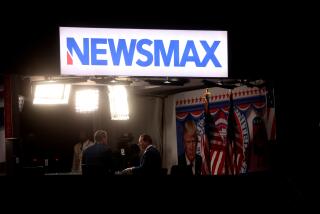E-Vote Firm Agrees to Pay State
- Share via
Touch-screen voting machine manufacturer Diebold Election Systems has agreed to pay $2.6 million to settle a lawsuit that accused the Texas-based company of misleading local and state officials in order to sell software and voting machines to several California counties.
A voters’ rights advocate filed the lawsuit in Alameda County in November 2003, contending that Diebold made false statements about the security of the vote-tabulating equipment it sold to Alameda County.
Atty. Gen. Bill Lockyer joined in the lawsuit in September and sought to recoup some of the millions of dollars in state money that was paid to Diebold for election systems and software. There were no reports that the equipment malfunctioned in November. Under terms of the settlement, which needs a judge’s approval, $1.625 million would go to the state, $475,000 to Alameda County and $500,000 to a poll-worker training project at UC Berkeley.
Diebold also agreed to make improvements to the vote-tabulating equipment it sold to 17 California counties.
Diebold also could be required to pay the legal expenses of Bev Harris, who advocates accurate election systems through her website blackbox voting.org. Harris filed the lawsuit under a state law that allows the public to seek damages from companies that defraud the state. A judge will decide whether she should be awarded part of the settlement.
Harris says the vote-tabulating equipment Diebold sold to Alameda County could be manipulated at election offices to skew the results. The company says that its equipment is secure and that there has been no evidence that its systems have been breached in California.
Still, the Alameda County system and a different Diebold model in San Diego County malfunctioned in the March primary. An undetermined number of San Diego County voters were turned away from the polls because of the malfunction in March; Alameda County voters cast paper ballots at affected poll sites.
In a statement Wednesday, Diebold said it settled to repair its relationship with the state. The company said the disputed equipment worked well in California and several other states in the Nov. 2 election.
The settlement follows other public relations problems for Diebold. In August 2003, Diebold chief executive Walden O’Dell sent invitations to a $1,000-a-plate political fundraiser at his home in Ohio and announced that he was “committed to helping Ohio deliver its electoral votes to the president.”
Amid questions about the company’s partiality, O’Dell announced this year that he would no longer participate in political fundraising.
Then came the problems in the March primary. California Secretary of State Kevin Shelley banned the use of one Diebold model, the AccuVote TSx, which was used in four counties for the November election, saying the company misrepresented its status in getting federal approval of the TSx.
Shelley issued a statement Wednesday praising the state’s settlement with Diebold.
“The AG’s decision to take action against Diebold sends a clear message that California will not tolerate deceitful conduct by voting machine companies,” Shelley said.
“It also serves to protect local elections officials as they seek to acquire secure, federally qualified and state-certified systems.”
More to Read
Get the L.A. Times Politics newsletter
Deeply reported insights into legislation, politics and policy from Sacramento, Washington and beyond. In your inbox twice per week.
You may occasionally receive promotional content from the Los Angeles Times.











